Rakugo Performance in Egypt: The Utmost Importance of "Pauses"
Utazo Katsura (Rakugo Performer)
The Japan Foundation, Cairo invited rakugo performer Utazo Katsura to Egypt, and organized rakugo performances in Japanese (with Arabic subtitles) and English in Cairo and Alexandria. Upon his return to Japan, he contributed an article about his rakugo performances in Egypt, the local circumstances, and the change that occurred in his attitude from the moment he received the request to deliver rakugo performances until his return to Japan.
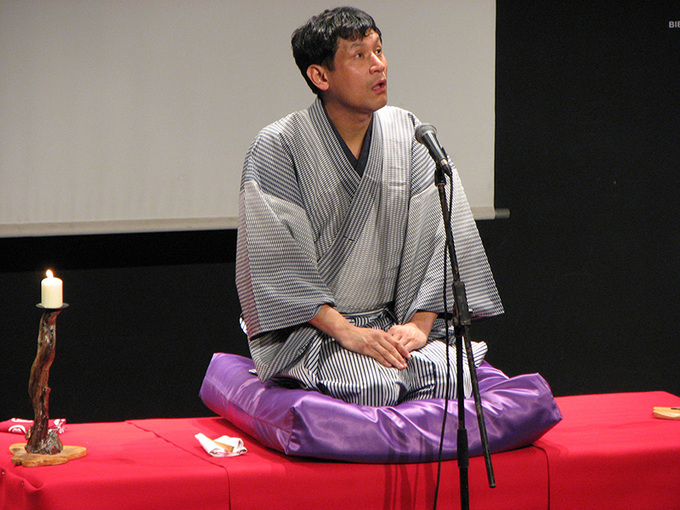
The "pause" in a story
What is the most important thing in rakugo storytelling? I believe nothing is more important than "pause."
In rakugo, diction, articulation, fluency and intonation can be learned, to a certain extent, from your seniors, but the way to insert a pause when delivering a story cannot be taught. The only way to develop this skill is to think and refine your own way to put pauses in your performance.
In fact, rakugo performances by fellow performers, who are not very good at making appropriate pauses, tend to not get many laughs (although I cannot talk big on this account). In everyday life, as well, people who are bad at making pauses when they speak keep failing and are scolded for being "spaced-out." This pause can work as a space between lines, a margin, and air. In other words, those who can read between the lines stand a better chance of being chosen among the stones and polished into jewels. So great is the importance of pause in rakugo that we have a saying "The devil is in the pause."
A poorly-timed performance request
This brings me to the tour in Egypt. It has been a lifelong dream of mine to perform there, but regretfully the timing was poor. The email from the Japan Foundation, Cairo, inquiring whether I would be interested in performing in Egypt, arrived on January 16 of this year. Although this unexpected invitation confused me, I immediately responded "Of course." Thus, suddenly, it was decided that I would deliver rakugo performances in Cairo and Alexandria at the end of March. The performances were to be delivered in Japanese with Arabic subtitles and in English.
So it was true. A mail from Cairo does come to he who waits.
Yet, something terrible occurred almost immediately I accepted the request, and this made me feel that I had no time for joking around. Only four days after I accepted the invitation, the Islamic State in Iraq and the Levant (ISIL) released a video of Japanese hostages. Rather than being quickly resolved, the situation ended up with the worst possible outcome. In the aftermath of the tragedy, we were bombarded on a daily basis with news about horrific incidents related to ISIL. On February 15, 21 Egyptian Coptic Christians were beheaded in Libya by ISIL. Then, on March 18, only three days before I left Japan, a terrorist organization related to ISIL opened fire at foreign tourists in the National Bardo Museum in the North African country of Tunisia. Three Japanese tourists were among those killed in this terrorist act.
The images of the atrocious acts committed by ISIL that I saw on the Internet kept flashing in the back of my mind. (I so regretted seeing them.) Disregarding the warnings from those around me, I left for Egypt as if under some evil influence.
All in all, nothing dangerous happened during my stay there. I completed the four performances and safely returned to Japan. Yet today, approximately a month later, I look back at the six days I spent in Egypt and feel under the spell of a strange illusion. Did I really go to Egypt, or was that just a dream?
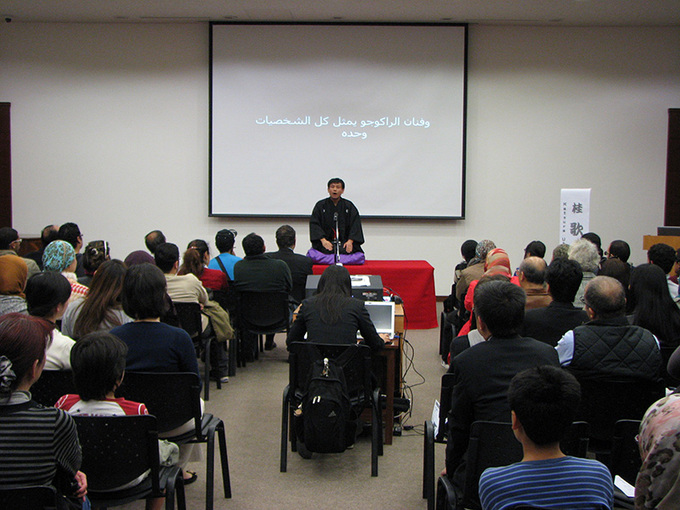
Rakugo performance in Japanese with Arabic subtitles
The scenery of Egypt, the country of my dreams
Because of the sand storms, the buildings look as if brown paint has been sloshed all over them. The loud horns of the cars stir up an incredible cacophony. Azan, the call to prayer, blasts from the minarets of mosques in the mornings and evenings. The Egyptian men I saw would either argue or smoke water pipes. Thick-chested, bellicose and forward, they were also friendly and cordial in a somewhat peculiar way. The Egyptian women were beautiful, modest and reserved, yet cheerful and quick to laugh.
I remember eagerly watching TV programs about Egypt as a child. Or reading and re-reading feature articles in occult magazines. The pyramids, which I finally got to visit at the age of 50, were truly enormous, and the cool, dimly-lit staircases inside them reminded me of passages to the afterlife.
The "pause" born at my performances in Egypt
On the first day of the tour, I performed rakugo in Japanese with Arabic subtitles in Cairo, and on the following day, I performed rakugo in English. The next day, I traveled to Alexandria. That night, I performed rakugo with the subtitles. On the fourth day, I performed rakugo in English. We worked around the schedule to fit the aforementioned visit to the pyramids and a visit to the ruins in Alexandria, both carried out in a great hurry. I believe, however, that I managed to maintain the high level of elation throughout my stay in Egypt precisely because I swept like a storm through the limited time we had in the country. Of course, I also maintained the nervous tension. That is perhaps why unique "pauses" were born in the rakugo stories at each of the four performances, and the audience enjoyed them without getting bored. Overall, my conclusion is that the performances in Egypt were not poorly timed at all.
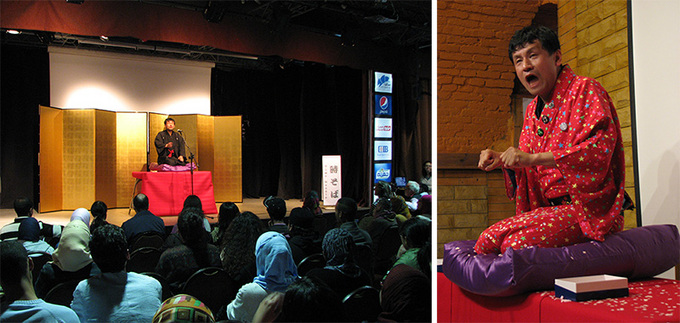
Left and right: Rakugo performance in English
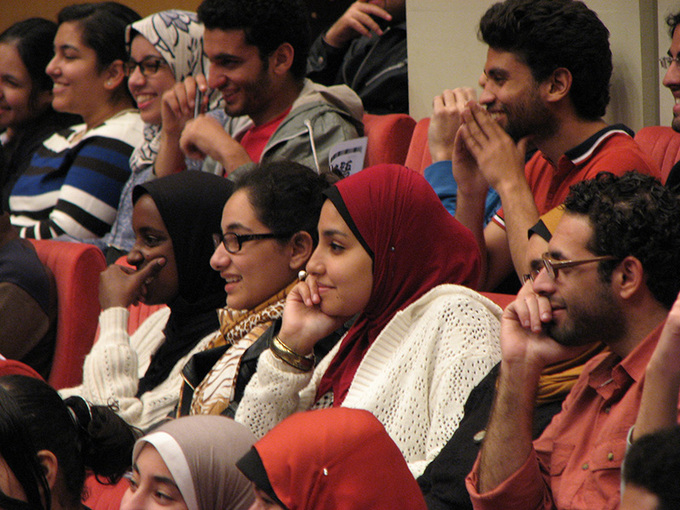
The audience listening attentively to the rakugo stories
It would pain me if you think that I am tooting my own horn, but in fact the audience at each of my performances laughed a lot and listened with uninterrupted concentration, rapt attention, and sparking eyes my clumsy rakugo stories (in Japanese with subtitles, and in English). In fact, I think that their reaction exceeded the response I normally receive in Japan, probably because they were interested in the culture of traditional performance arts, while Japanese tend to take it for granted. From a Japanese perspective, Egypt remains a distant foreign country, but the power of rakugo made me feel closer to the audience. For me, as a rakugo performer, that was a moment of sheer joy.
In conclusion, I would like to express my heartfelt gratitude to all members of the Japan Foundation, Cairo who invited me, all parties who cooperated in organizing the performances, and all guests who came to see them.
Postscript: I would like to announce the publication of my travel story about the performances in India and Sri Lanka organized by the Japan Foundation in 2011. The title of the book is Sekai wo Neta ni Kakeru Rakugoka: Indo Suriranka-hen [Rakugo performer takes on the world: India and Sri Lanka] (Seiunsha). I hope you will enjoy it.
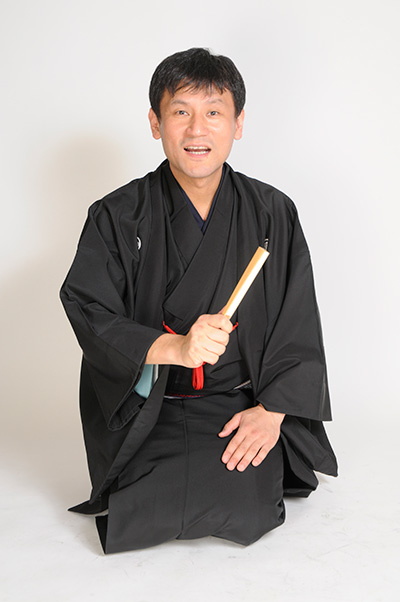 Utazo Katsura
Utazo Katsura
Rakugo performer. Utazo Katsura was born in Sakai City, Osaka Prefecture. After graduating from the Faculty of Economics of Daito Bunka University, he was accepted as apprentice by rakugo master Utamaru Katsura in 1992, under the name of Utaro. In 1996, he was promoted to futatsume (a recognized rank for independent rakugo performers) and took the name Utazo. In the spring of 2005, he rose to shinuchi (the highest rakugo performer rank), and conducted a two-month tour in honor of his promotion, performing at Shinjuku Suehiro-tei, Asakusa Engei Hall, Ikebukuro Engeijo, Oedo Nihonbashi-tei, and Ueno Hirokoji-tei. In addition to his performances at the traditional rakugo venues of Tokyo, today he is proactively engaged in rakugo stage events all over Japan, and also enthusiastically conducts performances overseas. In 2012, he performed rakugo in English in Los Angeles and Seattle, the U.S. In 2014, he went on a tour in Uzbekistan and Kazakhstan, and in 2015 performed in Egypt and Kenya. His performances are extremely well-received by foreign audiences. Occasionally, he takes the role of TV reporter, and is also an author active across a diverse range of genres: from magazine columns to novels. In 2010, Utazo Katsura was among the five finalists selected in the All Yomimono New Writers' Prize. Today, he continues to write between his numerous stage appearances as a rakugo master.
Back Issues
- 2024.11. 1 Placed together, we …
- 2024.5.24 The 50th Japan Found…
- 2024.5.24 The 50th Japan Found…
- 2024.2.19 Movie Theaters aroun…
- 2024.2.19 Movie Theaters aroun…
- 2023.4.24 The 49th Japan Found…
- 2022.10.24 Inner Diversity <2> …
- 2022.10. 5 Living Together with…
- 2022.6.13 The 48th Japan Found…
- 2022.6. 3 The 48th Japan Found…

